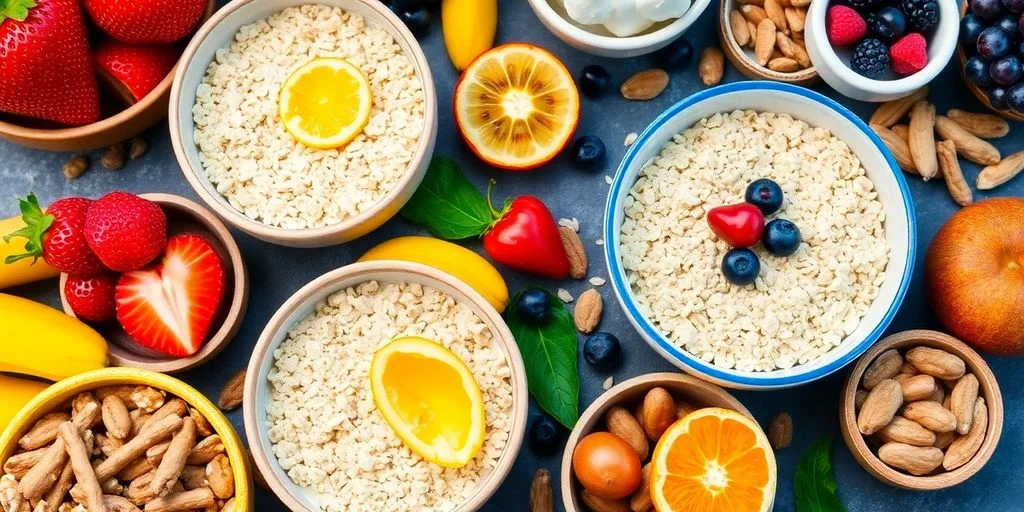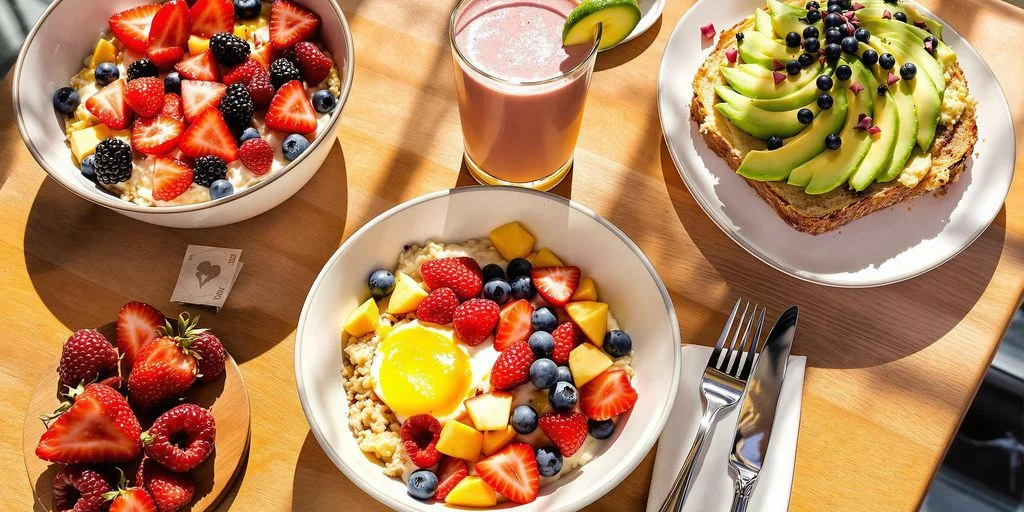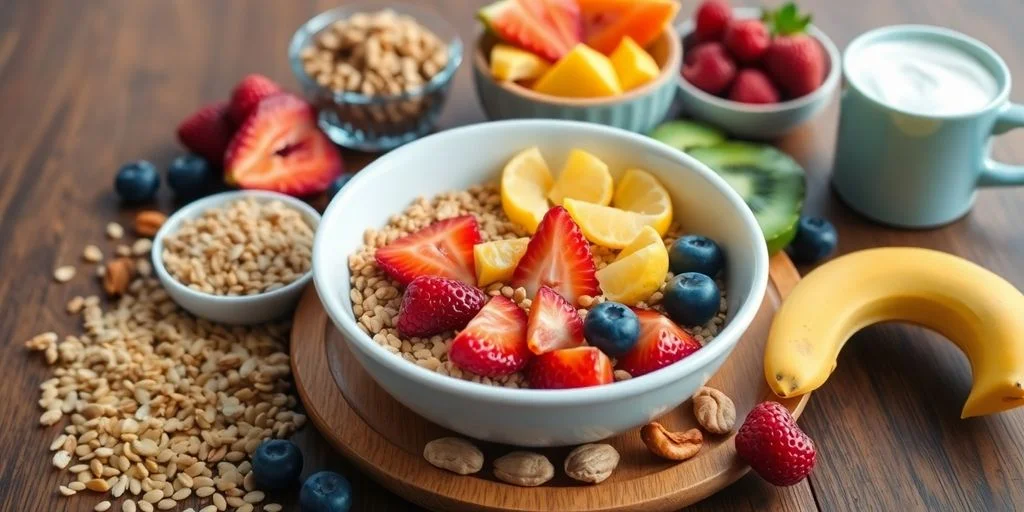introduction:
Ever wondered what the healthiest food breakfast is? Breakfast is more than just a meal; it’s the start of your day. Eating the right foods in the morning can set the tone for how you feel and perform throughout the day. From boosting your metabolism to helping manage your weight, a nutritious breakfast is key. Let’s dive into some expert recommendations and find out what makes a breakfast truly healthy.
Key Takeaways
- Breakfast kickstarts your metabolism and helps with weight management.
- Opt for whole grains, proteins, and healthy fats to fuel your day.
- Avoid high-sugar and highly processed breakfast foods.
- Incorporate superfoods like chia seeds and avocados for extra nutrients.
- Customize your breakfast to fit your nutritional needs and lifestyle.
- the Healthiest Food to Eat for Breakfast

Understanding the Importance of a Healthy Breakfast
Why Breakfast is Considered the Most Important Meal
Breakfast is often hailed as the most important meal of the day, and there’s good reason for that. Starting your day with a nutritious breakfast can set the tone for your entire day. It helps kickstart your metabolism, providing the energy you need to tackle daily tasks. Skipping breakfast, on the other hand, can leave you feeling sluggish and more likely to overeat later in the day.
Impact of Breakfast on Metabolism and Weight Management
Eating a balanced breakfast can significantly impact your metabolism and weight management. When you eat in the morning, you “break the fast” from overnight, which helps your body burn calories more efficiently throughout the day. Studies suggest that people who regularly eat breakfast tend to have a healthier weight compared to those who skip it. A good breakfast can help stabilize your blood sugar levels, reducing the likelihood of unhealthy snacking.
Common Breakfast Mistakes to Avoid
While breakfast is important, making the wrong choices can be counterproductive. Here are some common mistakes to avoid:
- Choosing sugary cereals or pastries: These can cause a rapid spike in blood sugar, followed by a crash that leaves you feeling tired and hungry.
- Skipping protein: A breakfast lacking in protein can leave you feeling unsatisfied. Include sources like eggs, Greek yogurt, or nuts.
- Ignoring portion sizes: Even healthy foods can contribute to weight gain if you consume them in large quantities. Pay attention to serving sizes to maintain a balanced diet.
Remember, breakfast is not just about eating something; it’s about eating the right things. A well-rounded breakfast can make a big difference in how you feel and perform throughout the day. For more insights, experts emphasize that eating breakfast is beneficial for both mental and physical health, regardless of age.https://recipesofangels.com/easy-date-night-recipes-for-a-romantic-evening/#more-440
Nutrient-Rich Foods to Start Your Day
Benefits of Whole Grains in Breakfast
Whole grains are a fantastic way to kick off your morning. They’re packed with fiber, which helps you feel full and satisfied longer. This means you’re less likely to snack before lunch. Plus, whole grains like oats, barley, and quinoa provide essential vitamins and minerals like iron, magnesium, and B vitamins. Here’s a quick list of why whole grains should be a breakfast staple:
- Fiber-rich: Helps keep your digestive system in check.
- Nutrient-dense: Offers a good source of vitamins and minerals.
- Sustained energy: Provides a slow release of energy to keep you going.
Incorporating Healthy Fats with Avocados and Nuts
Healthy fats are essential for a balanced diet, and breakfast is the perfect time to include them. Avocados, often called “alligator pears,” are loaded with heart-healthy unsaturated fats, fiber, and a range of vitamins like E and C. Nuts like almonds and walnuts are another great source of healthy fats. They’re also rich in protein and can keep you full. Here’s how you can add them to your breakfast:
- Avocado toast: Top whole-grain bread with smashed avocado.
- Nut butter: Spread almond or peanut butter on toast or add to smoothies.
- Whole nuts: Sprinkle over yogurt or oatmeal.
The Role of Protein in Morning Meals
Protein is a powerhouse nutrient that’s crucial for muscle repair and growth. Including protein in your breakfast can help control your appetite and keep you energized. Eggs are a classic choice, offering a complete protein with all essential amino acids. Here are some protein-packed breakfast ideas:
- Eggs: Boiled, scrambled, or in an omelet with veggies.
- Greek yogurt: A creamy option rich in protein and probiotics.
- Chia seeds: Add to smoothies or oatmeal for an extra protein boost. Chia seeds are especially versatile and nutritious, making them a perfect addition to various breakfast dishes.
Starting your day with nutrient-rich foods can set a positive tone for the rest of your meals. It’s not just about eating breakfast; it’s about eating the right breakfast. Whole grains, healthy fats, and proteins are the building blocks of a meal that fuels your body and mind effectively.
Expert-Recommended Breakfast Options
Top Picks for a Balanced Breakfast
Finding the right breakfast can be a game-changer for your day. Experts often suggest starting with nutrient-dense foods that fuel your body without weighing you down. Here are some top picks:
- Oatmeal: A classic choice that’s both filling and versatile. Add some nuts or berries for extra nutrients.
- Eggs and Vegetables: Packed with protein and essential vitamins, this combo supports overall health and longevity.
- Greek Yogurt with Chia Seeds: High in protein and fiber, this option helps keep you full longer.
Quick and Healthy Breakfast Ideas for Busy Mornings
Not everyone has time for a sit-down breakfast, but that doesn’t mean you should skip it. Here are some quick options:
- Overnight Oats: Prepare them the night before with your favorite toppings.
- Smoothie Bowls: Blend fruits, spinach, and a scoop of protein powder for a nutrient-packed start.
- Nut Butter on Whole-Grain Toast: Simple, quick, and satisfying.
How to Customize Your Breakfast for Nutritional Needs
Your breakfast should cater to your personal health goals and dietary needs. Here’s how you can tailor it:
- For Weight Loss: Focus on high-protein and fiber-rich foods to keep you satiated.
- For Energy Boost: Incorporate whole grains and healthy fats.
- For Muscle Building: Add more protein through eggs, yogurt, or protein shakes.
Breakfast sets the tone for your day. By choosing the right foods, you can enhance your energy levels, improve concentration, and support your overall health. Remember, it’s not just about eating something—it’s about eating the right thing.

The Science Behind Breakfast Choices
Understanding the Glycemic Index and Breakfast Foods
Ever wonder why some breakfasts leave you feeling full and others make you crash by 10 AM? It all comes down to the glycemic index (GI). Foods with a low GI release sugar slowly into your bloodstream, keeping your energy steady. Think oats, whole grains, and most fruits. On the other hand, high-GI foods like sugary cereals can spike your blood sugar, leading to those dreaded energy dips. Choosing the right breakfast can set the tone for your entire day.
The Role of Fiber in a Satisfying Breakfast
Fiber is like the unsung hero of breakfast. It fills you up, keeps your digestive system running smoothly, and helps manage your blood sugar levels. Foods like whole-grain bread, oats, and fruits are fiber powerhouses.
- Keeps you full longer
- Supports healthy digestion
- Helps control cholesterol levels
How Breakfast Affects Blood Sugar Levels
Breakfast plays a crucial role in managing your blood sugar. Skipping it can lead to overeating later, while a balanced breakfast can help stabilize those levels throughout the day. Include a mix of protein, healthy fats, and high-carb breakfast options like oats or whole-grain toast to keep your blood sugar in check.
Breakfast isn’t just a meal—it’s your body’s wake-up call. By choosing wisely, you can maintain energy and focus, setting yourself up for a productive day.
Avoiding Unhealthy Breakfast Traps
Identifying High-Sugar Breakfast Foods
Breakfast can be a minefield of sugary temptations. From those colorful cereals to the pastries at your local coffee shop, many breakfast favorites are loaded with added sugars. These foods might taste great, but they can send your blood sugar on a rollercoaster ride, leaving you feeling drained not long after eating. Instead of starting your day with a sugar rush, aim for foods that are low in sugar and high in fiber, like oatmeal or whole-grain toast. Be sure to check nutrition labels carefully; if sugar is one of the first ingredients listed, it might be time to reconsider.
The Downside of Processed Breakfast Options
Processed foods are easy to grab when you’re in a hurry, but they often come with a hidden cost. Many are high in refined grains, unhealthy fats, and sodium, which can contribute to weight gain and other health issues over time. Think of items like breakfast sandwiches from fast-food chains or frozen waffles. These might save you time, but they don’t do your body any favors. Instead, try preparing simple, wholesome breakfasts at home. A piece of whole-grain toast with avocado or a quick smoothie with fresh fruits can be just as convenient and much better for you.
Healthier Alternatives to Common Breakfast Foods
Finding healthier alternatives to your usual breakfast choices doesn’t have to be hard. Swap out sugary cereals for steel-cut oats topped with berries, or replace white bread with whole-grain varieties. Instead of reaching for unhealthy foods like soda, cookies, and processed meals, consider nutrient-dense options like Greek yogurt with nuts or a slice of whole-grain bread with almond butter. These swaps not only provide essential nutrients but also keep you full longer, helping you avoid the mid-morning energy crash.
Starting your day with a nutritious breakfast sets the tone for healthier choices throughout the day. By making small changes, you can transform your morning meal into a powerhouse of nutrition that supports your overall well-being.
Incorporating Superfoods into Your Morning Routine
Benefits of Chia Seeds and Flaxseeds
Starting your day with superfoods like chia seeds and flaxseeds can provide a powerhouse of nutrients. These tiny seeds are packed with fiber, omega-3 fatty acids, and protein, which can help keep your energy levels steady throughout the morning. Chia seeds, in particular, are known for their ability to absorb liquid and expand, which makes them a great addition to smoothies or overnight oats, providing a satisfying texture and keeping you full longer. Flaxseeds, when ground, offer an easy way to boost your intake of essential nutrients like magnesium and calcium. Try sprinkling them on yogurt or mixing them into your pancake batter for an extra health kick.
Adding Leafy Greens to Your Breakfast
Leafy greens might not be the first thing that comes to mind for breakfast, but they’re a fantastic way to sneak in some extra nutrients. Spinach, kale, and arugula are rich in vitamins A, C, and K, as well as folate and iron. Adding a handful of greens to your morning smoothie or omelet can enhance the nutritional profile of your meal without overwhelming the flavor. You can even toss some greens on top of your avocado toast for a fresh and vibrant start to your day. Greens are not only low in calories but also high in fiber, which helps keep your digestive system running smoothly.
Exploring the Nutritional Value of Berries
Berries are a delightful way to add natural sweetness and a burst of flavor to your breakfast. Blueberries, strawberries, and raspberries are full of antioxidants, vitamins, and fiber. These small fruits are excellent for maintaining heart health and can help reduce inflammation. Try adding a handful of berries to your cereal, yogurt, or smoothie. You can also make a quick berry compote to top your pancakes or waffles. Not only do berries taste great, but they also add a pop of color to your plate, making your breakfast more visually appealing.
Incorporating superfoods into your breakfast doesn’t have to be complicated. A few simple tweaks can transform your morning meal into a nutrient-rich powerhouse, setting a positive tone for the rest of your day.
Planning Your Breakfast for Optimal Health
Balancing Macronutrients in Your Morning Meal
When planning breakfast, it’s all about balance. You want a mix of carbohydrates, protein, and fats. Carbs give you energy, protein keeps you full, and fats are important for brain health. Here’s a quick checklist:
- Carbohydrates: Opt for whole grains like oats or quinoa.
- Protein: Eggs, Greek yogurt, or tofu can do wonders.
- Fats: Avocados or nuts can be your go-to.
Seasonal and Local Ingredients for Breakfast
Eating seasonal and local is not just trendy; it’s better for you and the planet. Seasonal foods are fresher and often more nutritious. Plus, buying local supports your community. Think about:
- Fresh berries in summer.
- Root vegetables in winter.
- Leafy greens like spinach or kale year-round.
Meal Prep Tips for a Healthy Start
Mornings can be hectic, so prepping your breakfast in advance can save time and stress. Here are some tips:
- Overnight oats: Mix oats with yogurt or milk, add some fruit, and let it sit overnight.
- Nutritious muffins: Bake with fruits, veggies, and whole grains, freeze them, and grab them on your way out.
- Smoothie packs: Pre-pack your smoothie ingredients in bags and freeze. Just blend with a liquid in the morning.
Breakfast doesn’t have to be complicated. With a little planning, you can start your day with a meal that fuels your body and mind.
Wrapping It Up: Your Morning Meal Matters
So, there you have it. Breakfast isn’t just about filling your stomach; it’s about fueling your day. Choosing the right foods can make a big difference in how you feel and function. Whether it’s a bowl of oatmeal with fresh berries or a slice of whole-grain toast with avocado, starting your day with a nutritious meal sets the tone for healthier choices throughout the day. Remember, it’s not just about avoiding the bad stuff but embracing the good. So next time you’re planning your morning meal, think about what will keep you energized and satisfied. Your body will thank you.
Frequently Asked Questions
What makes breakfast the most important meal of the day?
Breakfast jumpstarts your day by providing essential nutrients and energy. It helps control your appetite, keeps your blood sugar steady, and fuels your body for the morning’s activities.
What are some common breakfast mistakes to avoid?
Common mistakes include skipping breakfast, choosing sugary cereals, or eating too many processed foods. These can lead to energy crashes and poor concentration.
Why should I include whole grains in my breakfast?
Whole grains are packed with fiber and nutrients. They help keep you full longer, support digestion, and provide a steady release of energy.
How can I add protein to my morning meal?
You can add protein by including eggs, Greek yogurt, or nut butter in your breakfast. These foods help build muscles and keep you satisfied.
Are there quick and healthy breakfast options for busy mornings?
Yes, you can try smoothies with fruits and spinach, overnight oats, or whole-grain toast with avocado. These are quick to prepare and nutritious.
What are some healthier alternatives to sugary breakfast foods?
Instead of sugary cereals, try oatmeal with fresh fruit, or a smoothie with natural ingredients. These options are lower in sugar and higher in nutrients.
